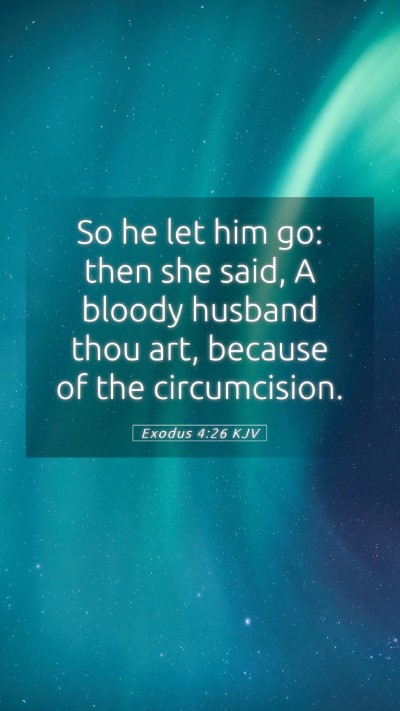Understanding Exodus 4:26
The verse Exodus 4:26 states, "So He let him go. Then she said, 'You are a bridegroom of blood!'—because of the circumcision." This passage carries significant implications for understanding God's covenant and the importance of obedience to His commands. Below is a comprehensive analysis drawn from public domain commentaries, which aligns with common queries regarding Bible verse meanings, Bible verse interpretations, and broader Bible verse commentary.
Contextual Backdrop
This verse appears in a pivotal moment in Exodus where Moses is called by God to lead the Israelites out of Egypt. Following his encounter with the Lord at the burning bush, Moses is on his way back to Egypt, but fails to circumcise his son. This lapse triggers a serious confrontation with God.
Commentary Insights
Several respected Biblical scholars provide valuable insights into this significant moment:
- Matthew Henry: Henry emphasizes the gravity of Moses’ oversight in neglecting to circumcise his son, interpreting it as a potential disobedience to God's covenant with Abraham. He suggests that God considers this a serious infraction, vital to the identity and spiritual integrity of Moses and the lineage of Israel.
- Albert Barnes: Barnes highlights the affectionate yet fearsome nature of God in this passage. He notes that God's anger towards Moses serves as a reminder of the seriousness of divine commands, particularly regarding ritual and covenant obligations. Circumcision symbolizes the commitment to God and adherence to His covenant, which Moses's failure threatens.
- Adam Clarke: Clarke provides a nuanced view focusing on Zipporah's reaction. He interprets her exclamation "a bridegroom of blood" as a profound acknowledgment of the life-and-death significance of adhering to God's laws and the necessary acts of obedience that flow from love for God and covenant fidelity.
Key Themes and Takeaways
- The Seriousness of God's Covenants: This passage illustrates the depth of God's expectations for His people and the critical nature of obedience as part of relational fidelity.
- The Role of Family and Leadership: Moses' responsibilities extend beyond himself; as a leader, his family's obedience and commitment to God reflect on his leadership.
- Divine Intervention and Mercy: God's willingness to confront Moses indicates His commitment to guide and correct His people, revealing both justice and grace.
Your Questions Answered
- What does Exodus 4:26 mean? This verse illustrates an episode of divine intervention where God emphasizes the importance of covenant adherence through the act of circumcision, reflecting broader themes of obedience.
- Why does God seek to kill Moses? The seriousness of Moses’ negligence prompts God to act, reminding readers that disobedience can have dire consequences, even for chosen leaders.
- What is the significance of Zipporah's words? Her declaration encapsulates the realities of blood and covenant in Biblical thinking, reaffirming the weight of obedience to God.
- How do we apply this in daily life? Understanding the importance of God’s commands and the seriousness of our commitments, particularly in spiritual leadership and family obligations, resonates deeply for modern believers.
Cross References
- Genesis 17:10-14: The covenant of circumcision is established as a sign between God and Abraham.
- Exodus 12:48: Highlights the importance of circumcision for participation in the Passover, illustrating the continuity of God's covenant.
- Joshua 5:2-9: Discusses the renewal of circumcision in Israel as they prepare to enter the Promised Land.
Further Study Resources
For those engaged in Bible study groups or seeking online Bible study opportunities, consider using Bible study tools and Bible study guides to delve deeper into the challenges of interpretation found within complex Biblical texts. Reflecting on passages such as this provides fertile ground for Bible study lessons that foster both understanding and spiritual growth.


